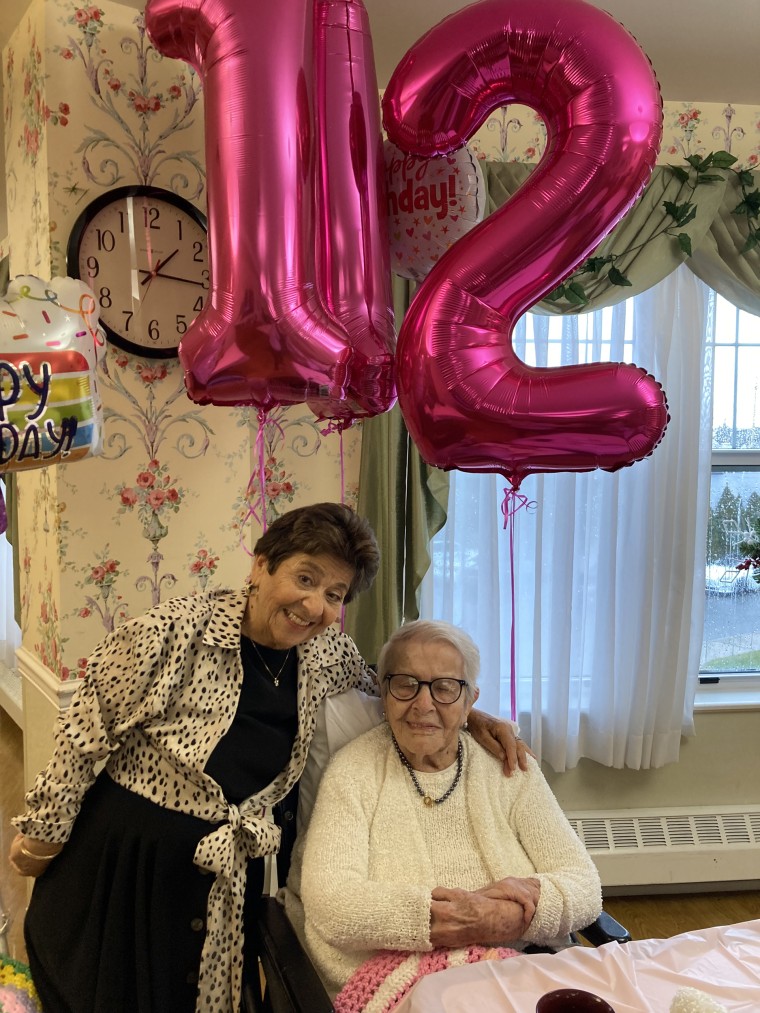At age 112, Holocaust survivor Rose Girone is still, as her daughter puts it, “thumbing her nose at Hitler.”
But the recent rise of antisemitism, fueled by the ongoing war in Gaza, is a frightening reminder that the age-old hatred of Jews lives on, as well, said Girone’s daughter, Reha Bennicasa.
“We say, ‘Never again, never again,’” said Bennicasa, 85. “But I don’t think this will ever end. This has been going on since the beginning of time.”
A Polish Jew now living in New York, Girone is believed to be the world’s oldest Holocaust survivor, one of a hardy group that — more than eight decades after the start of World War II — still numbers 245,000 people, according to a new demographic survey released Tuesday by the Conference on Jewish Material Claims Against Germany, better known as the Claims Conference.Nearly half the remaining survivors (49%) live in Israel, with 18% more in North America and another 18% in western Europe. Altogether, the survivors are spread across 90 counties with a median age of 86. Most are women.
“These are Jews who were born into a world that wanted to see them murdered,” Greg Schneider, the executive vice president of the Claims Conference, said in a statement. “The data forces us to accept the reality that Holocaust survivors won’t be with us forever, indeed, we have already lost most survivors.”
But Girone is still hanging on, her daughter said.
“She finds it difficult to talk now,” Bennicasa said. “But that’s a fairly recent thing.”

Girone was born Jan. 13, 1912, in the Polish village of Janów, which then was part of the Russian empire.
Then, in 1938, she married a German Jew named Julius Mannheim, and the couple eventually moved to the city of Breslau, which is now Wroclaw, Poland.
“It was an arranged marriage,” Bennicasa said. “She was eight months pregnant when it happened.”
By “it,” she means Kristallnacht, when the Nazis organized pogroms against Jews and targeted their businesses.
“My father and grandfather were taken to Buchenwald,” Bennicasa said, referring to the Nazi concentration camp. “Back then you could still get people out, and that’s what my mother did. But to get out, my father had to sign over his business and pretty much everything he had to the Nazis.”
The family also secured a visa to the only place left that was accepting Jewish refugees — Shanghai — Bennicasa said.
The Mannheim family arrived there around the time the Japanese invaded, and soon they and 18,000 other Jewish escapees from Germany found themselves confined to a squalid ghetto. Home for the young family was a converted washroom under a staircase that frequently flooded. They slept on a mattress infested with roaches and bedbugs.
“I was a kid, so I have some happy memories from that time,” Bennicasa said. “I remember the air raid attacks as fun, because afterwards we’d go outside and play with the hot shrapnel on the street.”
Two years after the war ended, the Mannheim family landed a visa to the U.S. and found a new home on Manhattan’s Upper West Side. But the marriage that survived so much fractured in the New World.
“My father was a Jew, but he was also a German, and he could never understand why he was being persecuted,” Bennicasa said. “He fought in World War I for Germany. He was a successful businessman. But when he came here, he had to start over again. Learn a new language. I think it was too much for him.”
Bennicasa’s mother, however, took up knitting in the Shanghai ghetto and parlayed that skill in America into a successful business in Queens. Then, in 1968, she met and married Jack Girone. Together, they moved to the Whitestone section of the New York City borough.
“She was a strong lady,” Bennicasa said. “I was blessed with a great mom who did everything for me.”
Bennicasa said that several years ago she and her mother went back to Wroclaw, a city that was repopulated after the war with Poles who had been expelled from their homes in what is now Ukraine and Belarus.
With the help of a cabdriver and a local priest, Bennicasa said, they found the building where they lived before they fled to China.
“It was very exciting,” she said. “I got to see my baby room. And the woman who lives there now was, at first, very cordial. But I think the longer we were there, the more threatened she began to feel that we would try to clear her out of the house.”
Bennicasa, who has a daughter of her own, said that even in these “scary times,” both she and her mother take great satisfaction in having outlived their Nazi persecutors. Both have been collecting claims compensation funded by the German government for decades.
“When I was born, Hitler had put out a list of approved first names, and my mother chose Reha from that list,” she said. “I got to name my daughter Gina.”
Source: | This article originally belongs to Nbcnews.com









